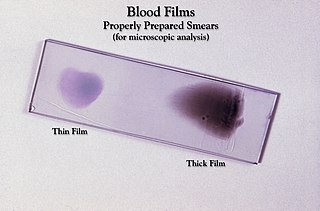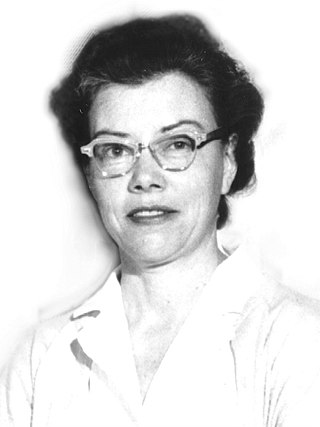Related Research Articles
The National Institute of Allergy and Infectious Diseases is one of the 27 institutes and centers that make up the National Institutes of Health (NIH), an agency of the United States Department of Health and Human Services (HHS). NIAID's mission is to conduct basic and applied research to better understand, treat, and prevent infectious, immunologic, and allergic diseases.

Clinical pathology is a medical specialty that is concerned with the diagnosis of disease based on the laboratory analysis of bodily fluids, such as blood, urine, and tissue homogenates or extracts using the tools of chemistry, microbiology, hematology, molecular pathology, and Immunohaematology. This specialty requires a medical residency.

A Medical Laboratory Scientist (MLS) or Clinical Laboratory Scientist (CLS) or Medical Technologist (MT) is a licensed Healthcare professional who performs diagnostic testing of body fluids, blood and other body tissue. The Medical Technologist is tasked with releasing the patient results to aid in further treatment. The scope of a medical laboratory scientist's work begins with the receipt of patient or client specimens and finishes with the delivery of test results to physicians and other healthcare providers. The utility of clinical diagnostic testing relies squarely on the validity of test methodology. To this end, much of the work done by medical laboratory scientists involves ensuring specimen quality, interpreting test results, data-logging, testing control products, performing calibration, maintenance, validation, and troubleshooting of instrumentation as well as performing statistical analyses to verify the accuracy and repeatability of testing. Medical laboratory scientists may also assist healthcare providers with test selection and specimen collection and are responsible for prompt verbal delivery of critical lab results. Medical Laboratory Scientists in healthcare settings also play an important role in clinical diagnosis. An estimated 70% of medical decisions are based on laboratory test results and MLS contributions affect 95% of a health system's costs.
James Linder is an American author, academic and businessperson, as well as an authority on university research commercialization. He is chief executive officer (CEO) of Nebraska Medicine, and most recently was president of the University Technology Development Corporation and chief strategist for the University of Nebraska system. He is also a professor of pathology and microbiology at the University of Nebraska Medical Center.

A medical laboratory or clinical laboratory is a laboratory where tests are conducted out on clinical specimens to obtain information about the health of a patient to aid in diagnosis, treatment, and prevention of disease. Clinical medical laboratories are an example of applied science, as opposed to research laboratories that focus on basic science, such as found in some academic institutions.
Sousan S. Altaie is Scientific Policy Advisor for the Office of In Vitro Diagnostic Devices in the United States. She joined the Food and Drug Administration in the Center for Drug Evaluation and Research in the Division of Anti-infective Drug Products as a primary reviewer in 1995. Six years later she joined the FDA's Center for Devices and Radiological Health as the Chief of Immunology and Molecular Diagnostics Branch. She is actively working as a member of the Global Harmonization Task Force (GHTF) and International Organization for Standardization (ISO) working groups. She was appointed the CDRH Critical Path Coordinator in 2004 and is actively involved in the Agency's Critical Path initiative. She has served as an observer, advisor and full member of various committees and subcommittees of the Clinical and Laboratory Standards Institute (CLSI).
Ann M. Arvin is an American pediatrician and microbiologist. She is the Lucile Salter Packard Professor of Pediatrics and Professor of Microbiology & Immunology Emerita at Stanford University. Arvin is a specialist of the Varicella zoster virus (VZV) and a prominent national figure in health. Arvin is currently the chief of the infectious diseases division of pediatrics at the Lucile Packard Children's Hospital, as well as the former Stanford's Vice Provost and Dean of Research.
Lynn Bry is a physician, anaerobic microbiologist, and microbial geneticist at Brigham & Women's Hospital, and Harvard Medical School. She has created multiple multi-institutional platforms to support scientific, clinical and educational activities, including the MadSci Network, Crimson prospective collection resource, Massachusetts Host-Microbiome Center, and Partners Healthcare-wide Pathogen Genomic Surveillance Program. She has also founded or co-founded successful start-up companies including iSpecimen and ConsortiaTX. She was awarded her MD and a PhD in Molecular Microbiology and Pathogenesis from Washington University School of Medicine. Her research studies host-microbiome interactions and their application to develop new therapeutics for human disease. She has authored or co-authored >70 peer-reviewed articles and book chapters, including original papers in Science detailing a molecular model of host-microbial cross-talk in the small intestine, and in Nature Medicine demonstrate therapeutic use of defined commensal microbes to reverse food allergies. Bry teaches medical school courses and is also a lecturer and mentor for the Project Success Program at Harvard Medical School.
Lucy S. Tompkins is a practicing internist, the Lucy Becker Professor of Medicine for infectious diseases at Stanford University, and a professor of microbiology and immunology. Since 1989, she has been the Epidemiologist and medical director of the Infection Control and Epidemiology Department for Stanford Hospital. She also has been the Associate Dean for Academic Affairs at the Stanford School of Medicine since 2001. She has been the recipient of multiple fellowships throughout her career, including the American Association for the Advancement of Science. Her current research centers around healthcare-related infections and bacterial pathogenesis.

Elizabeth Osborne King was an American microbiologist who discovered and described bacteria of medical importance at the United States Centers for Disease Control and Prevention from the late 1940s through the early 1960s. A 1984 CDC manual dedication referred to King as "internationally known as an authority on a variety of unusual bacteria." The genera Kingella and Elizabethkingia and several species of bacteria are named to honor her for her pioneering work. King died of cancer on April 8, 1966, in Atlanta, where she is interred in Oakland Cemetery.
Bilophila wadsworthia is a Gram-negative, obligately anaerobic, catalase-positive, bile-resistant, and asaccharolytic bacillus. Approximately 75% of B. wadsworthia strains are urease positive. B. wadsworthia is linked to various diseases and is not well known due to frequent misidentification of the bacteria, and the National Center for Biotechnology Information is including it the phylum of Proteobacteria. The two unique characteristics of B. wadsworthia are the utilisation of the sulfated amino acid taurine in the production of hydrogen sulfide and the rapid catalase reaction. This bacterium is susceptible to the β-lactam antibiotics imipenem, cefoxitin, and ticarcillin.
Patricia Charache was a physician specializing in infectious disease and microbiology. She was a faculty member at the Johns Hopkins University School of Medicine for more than 50 years, retiring as a Distinguished Professor Emeritus of Pathology, Medicine, and Oncology.
Colleen S. Kraft is an infectious disease physician, associate professor in the Department of Pathology and Laboratory Medicine, and the director of the Clinical Virology Research Laboratory at Emory University School of Medicine. In 2014, she led Emory University Hospital's effort to treat and care for Ebola virus disease patients and is currently working to address the COVID-19 pandemic in Georgia. She currently serves on Georgia's COVID-19 task force.

Robin Patel is a Canadian born microbiologist and Elizabeth P. and Robert E. Allen Professor of Individualized Medicine, a Professor of Microbiology, and a Professor of Medicine at the Mayo Clinic. She is widely recognized as a leader in the field of clinical microbiology and has held a variety of leadership positions including 2019–2020 President of the American Society for Microbiology (ASM) and Director of the Antibacterial Resistance Leadership Group (ARLG) Laboratory Center of the National institutes of Health. She is currently the Vice Chair of Education in the Department of Laboratory Medicine and Pathology at the Mayo Clinic, and Director of the Mayo Clinic's Infectious Diseases Research Laboratory, where she studies biofilms, antimicrobial resistance, periprosthetic joint infection and diagnostic testing of bacteria.
Gueh-Djen (Edith) Hsiung was a virologist and professor emeritus of laboratory medicine. She was one of the first women to achieve the rank of professor at the Yale School of Medicine.
David W. Denning is a British retired professor of infectious diseases and global health and medical mycology at the University of Manchester. He was the founding president, executive director and chief executive of Global Action For Fungal Infections (GAFFI) (2013-2023), which focusses on the global impact of fungal disease.
Sydney "Sid" Martin Finegold was an American physician, medical school professor, and medical researcher, specializing in anaerobic bacteriology.
Carey-Ann Burnham is a clinical microbiologist, and a professor of Pathology and Immunology, Molecular Microbiology, Pediatrics and Medicine in Washington University School of Medicine in St. Louis. She is an elected fellow of the American Academy of Microbiology.
John Charles Sherris was an English-American medical doctor, pathologist, and bacteriologist. He was the president of the American Society for Microbiology (ASM) in 1983.
Karen Colleen Carroll is an American infectious disease pathologist and medical microbiologist specialized in the evaluation of diagnostic platforms and the epidemiology of healthcare-associated infections. She is a professor of pathology and director of the division of medical microbiology at the Johns Hopkins School of Medicine.
References
- 1 2 3 4 "Cornelius' roots go back 50 years". Mitchell Daily Republic . March 9, 2013.
- ↑ "Ellen Jo Baron's Profile | Stanford Profiles".
- 1 2 3 4 5 6 7 8 9 Forbes, Betty A. (November 21, 2018). Munson, Erik (ed.). "Biographical Feature: Ellen Jo Baron, M.S., Ph.D". Journal of Clinical Microbiology . 56 (11). doi:10.1128/JCM.01392-18. PMC 6204666 . PMID 30185511.
- 1 2 "Dr. Baron Rebuilds Infectious Disease Diagnosis in Cambodia". Palisadian Post. June 20, 2013.
- ↑ National Academies of Sciences, Engineering; Division, Health and Medicine; Health, Board on Global; Threats, Forum on Microbial (December 8, 2017). "Biographical Sketches of Workshop Speakers and Moderators". Combating Antimicrobial Resistance: A One Health Approach to a Global Threat: Proceedings of a Workshop. National Academies Press (US) – via www.ncbi.nlm.nih.gov.
- ↑ "Diagnostic Microbiology Development Program - Company Profile and News". Bloomberg.com.